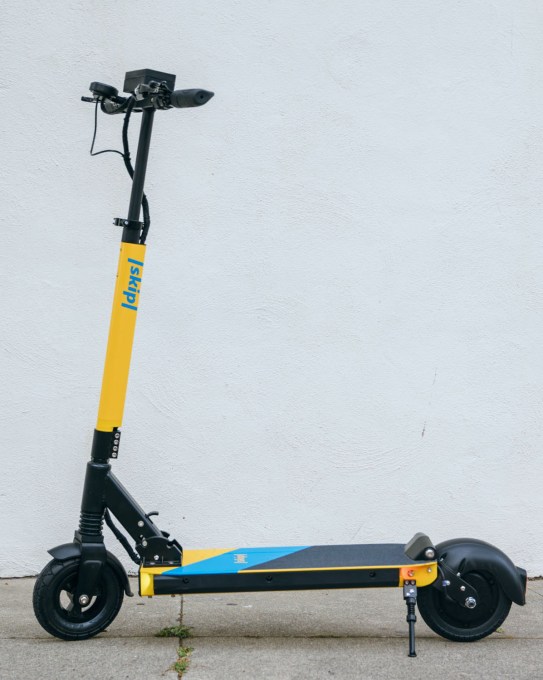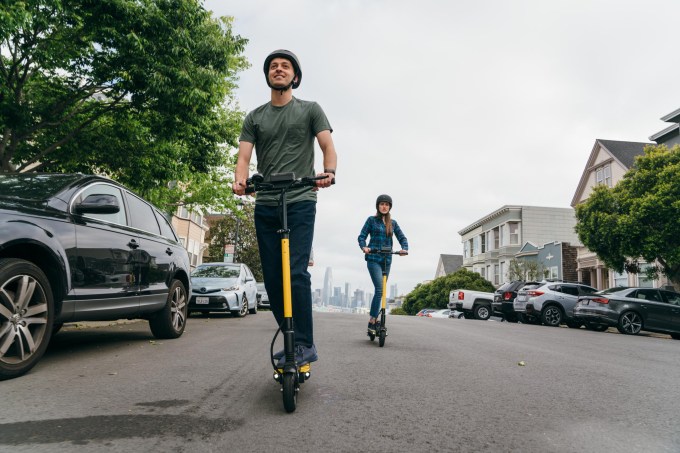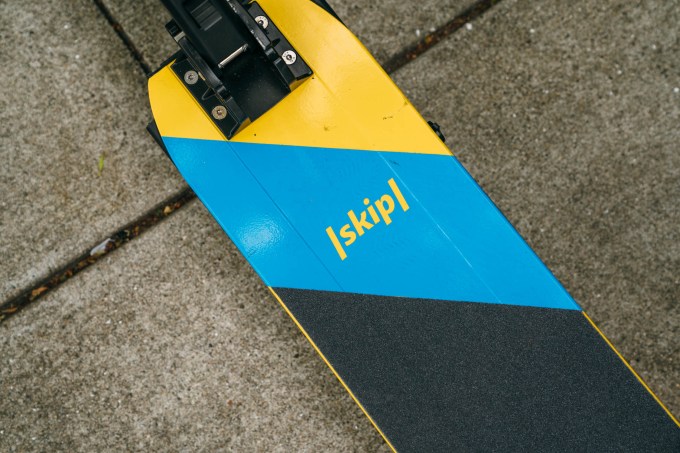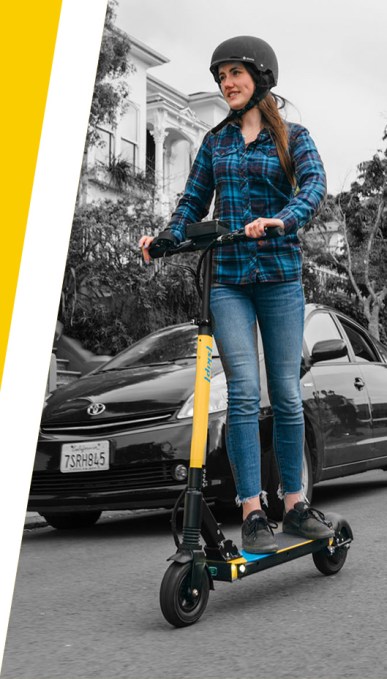Boosted Boards founders launch heavy-duty scooter renter Skip
All electric scooters are not created equal. I’ve found ones from Spin, Bird, and Lime to often be broken, shaky, or out of battery. But now the founders of Boosted Boards, which makes the steadiest and safest-feeling electric skateboards, are bringing their rugged hardware expertise to the scooter world. Today, they’re coming out of stealth with a supposedly stronger and longer-lasting dockless electric scooter rental startup called Skip. And the surprise is they’ll only operate where permitted unlike their backlashed competitors, with a deployment today in partnership with Washington D.C. and plans for San Francisco.
Formerly known by its Y Combinator codename Waybots, the company is exclusively announcing its funding and rebrand to Skip today on TechCrunch. The startup has raised a $6 million seed round led by Initialized Capital via Alexis Ohanian and Ronny Conway’s A Capital, with SV Angel joining in.
 “We think the vehicle matters” Skip and former Boosted co-founder/CEO Sanjay Dastoor tells me. “It’s not the same as rideshare where two or more companies are all using the same car. There’s a big spectrum of quality in the base vehicles. A lot of these companies are buying off the shelf vehicles that are designed for personal ownership. I think these vehicles will need to be designed for a different level of use and upkeep.”
“We think the vehicle matters” Skip and former Boosted co-founder/CEO Sanjay Dastoor tells me. “It’s not the same as rideshare where two or more companies are all using the same car. There’s a big spectrum of quality in the base vehicles. A lot of these companies are buying off the shelf vehicles that are designed for personal ownership. I think these vehicles will need to be designed for a different level of use and upkeep.”
That’s why Skip is modifying bigger pre-made scooters to be more durable, and plans to build its own custom scooters. For the same $1 plus $0.15 per minute price as other services, you get a wider riding platform, full suspension, and head/tail/brake lights. The strategy is that if people feel safe and steady riding Skips, they’ll choose them over the competition. And while low-grade scooters might feel too unstable for the bike lane, leading to complaints about sidewalk riding, Skips are meant to feel secure enough to cruise next to cars.
With so much well-funded competition, Skip will have to hope customers really notice the difference. And its by-permit-only policy could constrain growth. But if riders and cities decide they want a more reliable scooter service, Skip could carve out a solid business while being a better citizen.
Trusting Your Life To A Startup
My Boosted Board was perhaps my favorite gadget ever. After a decade as an unpowered longboard rider, I tested its electric skateboard in 2012 and loved the smooth rides so much I bought onet of the first 10 of the Kickstarter. It felt like being able to effortlessly surf uphill. I tried many others and consistently found them to feel much more jerky, wobbly, and unpredictable. That’s not what you want when you’re riding a handle-less vehicle in traffic, and essentially betting your life on some startup’s hardware.
But then I crashed. The human body is not equipped for a 22mph meeting with the pavement. The board performed perfectly, I just hit a gravel patch at full-speed, shattered my ankle, and couldn’t walk for 5 months. In conclusion, even the safest electric skateboards are risky because at high speeds, the form factor’s small hard wheels are too vulnerable to obstructions, and you’ve got no handle to save you. I haven’t skated the two years since.

Yet that’s why I think Skip has a real opportunity. There’s demand for these vehicles. Skip says it sees seven rides per day per scooter. They’re a natural complement to more expensive Ubers that have to wade through traffic. But the whole industry will fall apart if everyone’s getting injured. You can absolutely feel the lack of stability and smoothness when riding a janky or half-broken scooter. I think consumers will choose the safer device if one’s available.
Skip To A New Startup

Skip co-founder and CEO Sanjay Dastoor
“We noticed that small personal portable electric vehicles weren’t only awesome alone” but as an option alongside ridesharing, ridepooling, and car ownership, says Dastoor. “The future of transportation is a combination of these.”
Boosted co-founder Matt Tran left the company two years ago, while Dastoor exited a year ago. They wanted to try an electric vehicle service model, but “Boosted wasn’t really the right place to do that, because the company is still focused on building great hardware for people to buy.” Tran was running marketing and also craved his engineering roots. So together with Mike Wadhera, a founding team member of Involver which sold to Oracle, they formed Waybots.
Last summer, the company tried out a docked scooter sharing model in SF, but didn’t see great results. When they got accepted to YC, like Boosted before it, they started experimenting with a dockless version. Meanwhile, Washington D.C. had opened a pilot program for permitted dockless bikeshare, and Waybots convinced the city to give it the greenlight too.

“We’re the first permitted [dockless electric scooter] system operating anywhere” Dastoor believes. “A lot of the story around dockless scooters has come from SF, and from companies that have launched without informing anyone or working with anyone.” That’s led SF to ban unpermitted dockless scooter rentals. “What we saw in DC was the opposite. We’re working with the cities to deploy, share data with them, and engage with the community, and we’ve seen none of the backlash that we’ve seen in SF.”
Designed To Deter Complaints
Beyond actually being permitted, that’s also because Skip has built the scooters to discourage a lot of the most annoying scooter behaviors. The Speedway Mini4 36V 21Ah scooters Skip modifies can get up to 30 miles at 10mph per charge, which means they’re less likely to have dead batteries by the afternoon like the useless vehicles-turned-paperweights from competitors that I commonly stumble across in SF.
The durable hardware is meant to need less service so you’re less likely to rent a broken, or worse, half-broken-but-I’m-late-so-I’ll-ride-it-anyway scooter. You can adjust the handlebar height, they go up to 18mph and dual-suspension flattens road bumps.

As for keeping Skips from getting strewn in the sidewalks and obstructing pedestrians, Dastoor claims his company’s vehicles have more precise location tracking than competitors. That could help it tell the edge of a build from the center of the walkway. Combined with requiring users to photograph the scooter standing upright, and hardware in the vechiles, Skip is hoping to force users to park them properly. “They have to have the intelligence in them to give info back to the city or back to the operator to make sure they operating correctly” Dastoor says.
Unfortunately, Skip hasn’t solved the lack of helmets problem. Dastoor tells me “We’ve been looking at a bunch of ways to improve access to helmets” but for now there’s no on-vehicle compartment for them and the company merely encourages users to wear them.
 Personally, I think that’s crap. Sure, Citi Bike and other scooter companies don’t offer them either. But if these are meant to be serendipitously rented for short periods, it’s crazy to think anyone other than regular commuters will bring their own helmets. I think cities should demand them. And if they don’t, an inevitable scooter fatality that could have been prevented will make permitters more cautious. At least Skip says you have to be over 18 and plans to add ID verification for that soon.
Personally, I think that’s crap. Sure, Citi Bike and other scooter companies don’t offer them either. But if these are meant to be serendipitously rented for short periods, it’s crazy to think anyone other than regular commuters will bring their own helmets. I think cities should demand them. And if they don’t, an inevitable scooter fatality that could have been prevented will make permitters more cautious. At least Skip says you have to be over 18 and plans to add ID verification for that soon.
“I don’t really have a comment about our unit economics” Dastoor sidestepped, but notes how much cheaper a $1.50 or $3 ride is than hailing a car. We’ll have to see if competition spurs a scooter price war. For now, though, the well-equipped Skips have led customers to “want to use it over and over.” Still, with Lime reportedly trying to raise $500 million and Bird recently closing $100 million as they race to invade the world, Skip is starting late with a much smaller piggybank.
Competition aside, Dastoor cites maintaining relationships with cities as the startup’s biggest threat. Luckily, he says it will soon announce some big-name talent with experience here. I expect it’s hired someone like former Uber policy chief David Plouffe who already has connections.
Scoot To The Future
Where the dockless vechicle rental market goes is a mystery. Maybe it turns into a fundraising war, with the most aggressive deployers locking up markets, and the losers vaporizing in giant money bonfires. Maybe the cities get fed up, kick out the unpermitted, and only issue approvals to those with the best glad-handing or the best safety. Maybe users get tons of options on price, quality, and availability to choose from.
But absent the bad behavior spurring backlash, many who try dockless electric scooter and bike rentals love them. With traffic-jammed city streets and scarce parking, we could use ways to get cars off the road.
Eventually, I think we’ll see a ton of short rideshare trips turn into scooter cruises. And at today’s super low price point, walking could turn into a luxury depending on how you value your time. Even at minimum wage, you might save money paying $1.75 for a five-minute, one-mile Skip rather than walking for 20. Dastoor concludes, “It becomes part of their transportation routine and I think anything that does that is around to stay.”
No comments: